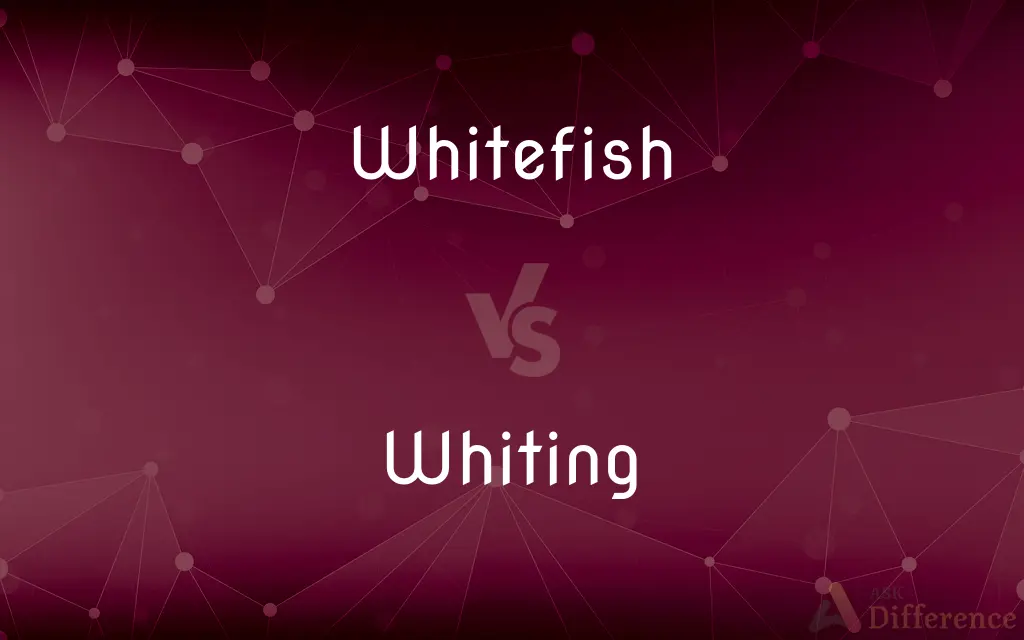Whitefish vs. Whiting — What's the Difference?
By Tayyaba Rehman & Maham Liaqat — Updated on March 29, 2024
Whitefish refers to several species in cold-water habitats, valued for their mild flavor and flaky texture. Whiting, a specific species, is known for its delicate taste and fine, light texture.

Difference Between Whitefish and Whiting
Table of Contents
ADVERTISEMENT
Key Differences
Whitefish encompasses a broad category of fish found in colder waters, often freshwater, and includes species like lake whitefish and Atlantic whitefish. Whereas whiting, also known as Merlangius merlangus, specifically refers to a marine species found in the Northeast Atlantic.
While both are appreciated for their culinary uses, whitefish varieties are noted for their versatility in recipes ranging from smoked to baked dishes, highlighting their mild and subtly sweet flavor. On the other hand, whiting is particularly prized for its fine, light texture and delicate taste, making it ideal for frying and serving in traditional dishes like fish and chips.
The habitat of whitefish species varies significantly, with many thriving in freshwater lakes and rivers, which contributes to their distinct, mild taste. Whiting, conversely, inhabits marine environments, which can influence its flavor profile, slightly altering it based on the salinity and temperature of the water.
Regarding nutritional value, whitefish are generally rich in omega-3 fatty acids, contributing to a healthy diet with benefits for heart health. Whiting, while also nutritious, may have slightly different levels of omega-3s and is often highlighted for its high protein and low fat content, making it a good choice for those looking for lean protein sources.
In the fishing industry, whitefish species are often caught using methods like gillnetting or longlining in freshwater systems, whereas whiting is commonly harvested from the sea, using trawls, which reflects the different ecological niches they occupy.
ADVERTISEMENT
Comparison Chart
Habitat
Cold-water habitats, often freshwater
Northeast Atlantic, marine environments
Culinary Uses
Versatile, used in smoked, baked dishes
Ideal for frying, traditional in fish and chips
Flavor
Mild, subtly sweet
Delicate taste, fine texture
Nutritional Value
Rich in omega-3 fatty acids
High protein, low fat, varies in omega-3 content
Fishing Methods
Gillnetting, longlining in freshwater
Trawling in marine environments
Compare with Definitions
Whitefish
A term for several species of cold-water fish, often found in freshwater.
The local cuisine specializes in smoked whitefish, a regional delicacy.
Whiting
A specific species of marine fish known for its delicate taste.
Whiting is often the fish of choice for classic fish and chips due to its delicate flavor.
Whitefish
Known for its flaky texture and mild flavor.
Whitefish is a popular choice for those who prefer subtly flavored seafood.
Whiting
Found in the Northeast Atlantic, belonging to the cod family.
Whiting, thriving in the cool waters of the Northeast Atlantic, is a relative of the cod.
Whitefish
Often used in traditional and cultural dishes in cold-water regions.
In many indigenous communities, whitefish is used in a variety of traditional dishes.
Whiting
Prized for its fine, light texture and versatility in cooking.
The chef prepared the whiting with a light batter, emphasizing its fine texture.
Whitefish
Includes species such as lake whitefish and Atlantic whitefish.
Lake whitefish, common in the Great Lakes, is a staple in many northern diets.
Whiting
Subject to commercial fishing, mainly for food consumption.
The fishing industry highly values whiting for its commercial demand, especially in Europe.
Whitefish
Valued for its health benefits, including a high content of omega-3 fatty acids.
Including whitefish in the diet is recommended for heart health due to its omega-3 content.
Whiting
Contains high levels of protein and low levels of fat, making it a healthy choice.
Whiting is a popular option for those seeking lean protein sources in their diet.
Whitefish
Any of various freshwater salmonid food fishes of the genera Coregonus and Prosopium chiefly of North America, having a generally white or silvery color.
Whiting
A pure white grade of chalk that has been ground and washed for use in paints, ink, and putty.
Whitefish
Any of various similar or related fishes, such as the lake herring, whiting, or menhaden.
Whiting
A food fish (Merlangius merlangus) of the eastern North Atlantic and the Black Sea, closely related to and resembling the cod.
Whitefish
See beluga.
Whiting
Any of various marine food fishes having delicate white flesh, especially several hakes of the genus Merluccius and several kingfishes of the genus Menticirrhus.
Whitefish
Any of many fish.
Whiting
The achromatic color of maximum lightness; the color of objects that reflect nearly all light of all visible wavelengths; the complement or antagonist of black, the other extreme of the neutral gray series. Although typically a response to maximum stimulation of the retina, the perception of white appears always to depend on contrast.
Whitefish
Any of several North American freshwater fish, of the genus Coregonus, used as food.
Whiting
The albumen of an egg.
Whitefish
Any of several other fish, such as whiting (Merlangius merlangus) or menhaden (Brevoortia spp. and Ethmidium spp.).
Whiting
The white part of an eyeball.
Whitefish
(fisheries) Any of several species of demersal fish with fins, particularly cod, whiting, and haddock, as opposed to the oily or pelagic fishes.
Whiting
A blank or unprinted area, as of an advertisement.
Whitefish
The beluga (both the sturgeon and the whale)
Whiting
Whites Pieces of laundry having a white or nearly white color.
Whitefish
To fish for whitefish.
Whiting
Whites White pants or a white outfit of a special nature
Tennis whites.
Whitefish
Any one of several species of Coregonus, a genus of excellent food fishes allied to the salmons. They inhabit the lakes of the colder parts of North America, Asia, and Europe. The largest and most important American species (Coregonus clupeiformis) is abundant in the Great Lakes, and in other lakes farther north. Called also lake whitefish, and Oswego bass.
Whiting
Whites The white dress uniform of the US Navy or Coast Guard.
Whitefish
Any market fish--edible saltwater fish or shellfish--except herring
Whiting
A white wine.
Whitefish
Flesh of salmon- or trout-like cold-water fish of cold lakes of the northern hemisphere
Whiting
A white pigment.
Whitefish
Silvery herring-like freshwater food fish of cold lakes of the northern hemisphere
Whiting
A white breed, species, or variety of animal.
Whiting
Any of various butterflies of the subfamily Pierinae, characteristically having chiefly white wings often with black markings.
Whiting
Also White A member of a racial group having light-colored skin, especially when of European origin and in some classifications also when of Middle Eastern or North African origin.
Whiting
Often whites Products of a white color, such as flour, salt, and sugar.
Whiting
The white or light-colored pieces, as in chess.
Whiting
The player using these pieces.
Whiting
The outermost ring of an archery target.
Whiting
A hit in this ring.
Whiting
Whites(Medicine) Leukorrhea.
Whiting
White A member of a conservative or counterrevolutionary faction, especially one opposing the Bolsheviks in the Russian civil war.
Whiting
Being of the color white; devoid of hue, as new snow.
Whiting
Weakly colored; almost colorless; pale
White wine.
Whiting
Pale gray; silvery and lustrous
White hair.
Whiting
Light or whitish in color or having light or whitish parts. Used with animal and plant names.
Whiting
Also White Of or belonging to a racial group of people having light-colored skin, especially when of European origin, and in some classifications also when of Middle Eastern or North African origin
Voting patterns within the white population.
Whiting
Habited in white
White nuns.
Whiting
Accompanied by or mantled with snow
A white Christmas.
Whiting
Incandescent
White flames.
Whiting
Intensely heated; impassioned
White with fury.
Whiting
White Of or relating to a conservative or counterrevolutionary faction, especially one opposing the Bolsheviks in the Russian civil war.
Whiting
With milk added. Used of tea or coffee.
Whiting
(Archaic) Unsullied; pure.
Whiting
(Printing) To cover or make illegible with white coloring. Often used with out.
Whiting
A fine white chalk used in paints, putty, whitewash etc.
Whiting
A fish, Merlangius merlangus (family Gadidae), similar to cod, found in the North Atlantic; English whiting US.
Whiting
Any fish of many species that resemble Merlangius merlangus:
Whiting
In family Gadidae:
Whiting
In family Sillaginidae, pl=s, inhabiting Indo-Pacific marine coasts, many species of which are commercially important whitefish.
Whiting
In family Sciaenidae, Menticirrhus americanus (Carolina whiting, king whiting, southern kingcroaker, and southern kingfish) found along the Atlantic and Gulf Coasts of the United States.
Whiting
Present participle of white
Whiting
A common European food fish (Melangus vulgaris) of the Codfish family; - called also fittin.
Whiting
Chalk prepared in an impalpable powder by pulverizing and repeated washing, used as a pigment, as an ingredient in putty, for cleaning silver, etc.
Whiting
Flesh of a cod-like fish of the Atlantic waters of Europe
Whiting
Flesh of any of a number of slender food fishes especially of Atlantic coasts of North America
Whiting
A small fish of the genus Sillago; excellent food fish
Whiting
Any of several food fishes of North American coastal waters
Whiting
Found off Atlantic coast of North America
Whiting
A food fish of the Atlantic waters of Europe resembling the cod; sometimes placed in genus Gadus
Common Curiosities
Are whitefish and whiting the same species?
No, whitefish refers to a group of species, and whiting is a specific species within the cod family.
Can you use whitefish and whiting interchangeably in recipes?
Yes, but their distinct flavors and textures may alter the dish slightly.
What differentiates whitefish from whiting in terms of habitat?
Whitefish can be found in cold freshwater habitats, while whiting is a marine species from the Northeast Atlantic.
Which is healthier, whitefish or whiting?
Both are healthy options, with whitefish being richer in omega-3s and whiting being a lean source of protein.
How do the culinary uses of whitefish and whiting differ?
Whitefish is versatile across various dishes, while whiting is especially favored for frying.
Do whitefish and whiting taste the same?
No, whitefish has a mild, subtly sweet flavor, while whiting is known for its delicate taste and fine texture.
What is the main fishing method for whitefish?
Methods like gillnetting or longlining in freshwater environments.
What part of the world is whitefish most commonly found?
In colder regions, particularly in northern freshwater lakes and rivers.
And for whiting?
Trawling in marine environments, particularly in the Northeast Atlantic.
Is whiting always found in saltwater?
Yes, whiting is a marine species found in the Northeast Atlantic.
Why is whiting a popular choice for fish and chips?
Its delicate taste and fine texture make it ideal for frying.
How does the texture of whitefish compare to that of whiting?
Whitefish typically has a flaky texture, while whiting is noted for its fine and light texture.
How do the omega-3 levels in whitefish and whiting compare?
Whitefish generally has higher omega-3 content, while whiting offers a good protein source with lower fat.
Are there environmental concerns associated with fishing for whitefish or whiting?
Sustainable fishing practices are important to manage stocks and avoid overfishing.
Can the diet of these fish affect their flavor?
Yes, the diet and habitat can influence the flavor profiles of both whitefish and whiting.
Share Your Discovery

Previous Comparison
Affliction vs. Suffering
Next Comparison
Deductive vs. HeuristicAuthor Spotlight
Written by
Tayyaba RehmanTayyaba Rehman is a distinguished writer, currently serving as a primary contributor to askdifference.com. As a researcher in semantics and etymology, Tayyaba's passion for the complexity of languages and their distinctions has found a perfect home on the platform. Tayyaba delves into the intricacies of language, distinguishing between commonly confused words and phrases, thereby providing clarity for readers worldwide.
Co-written by
Maham Liaqat















































